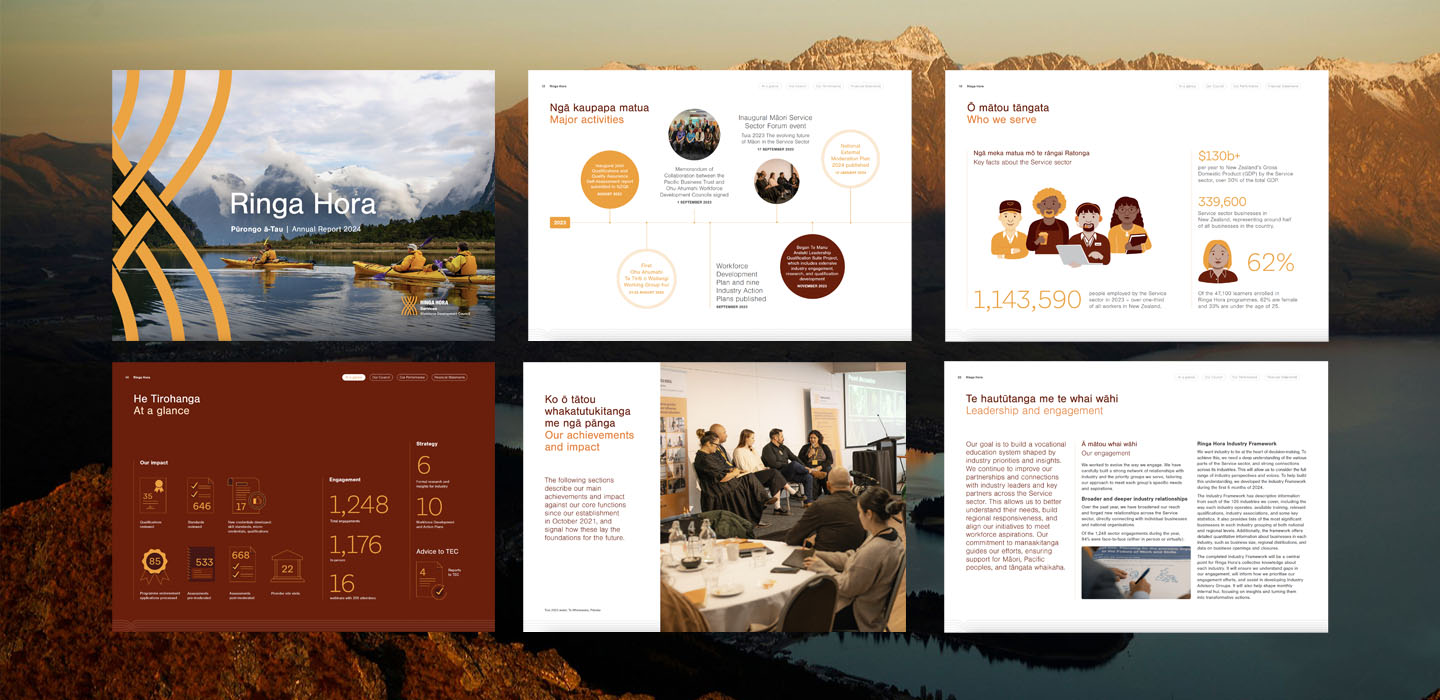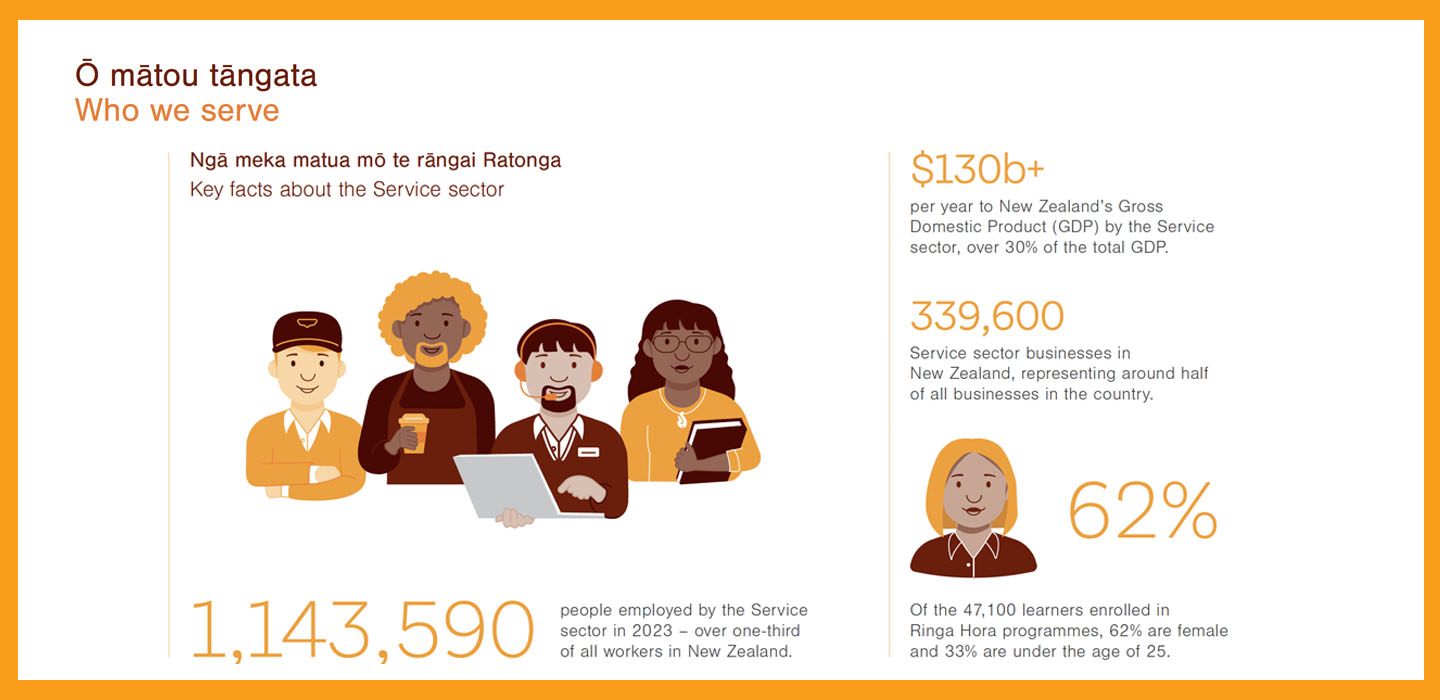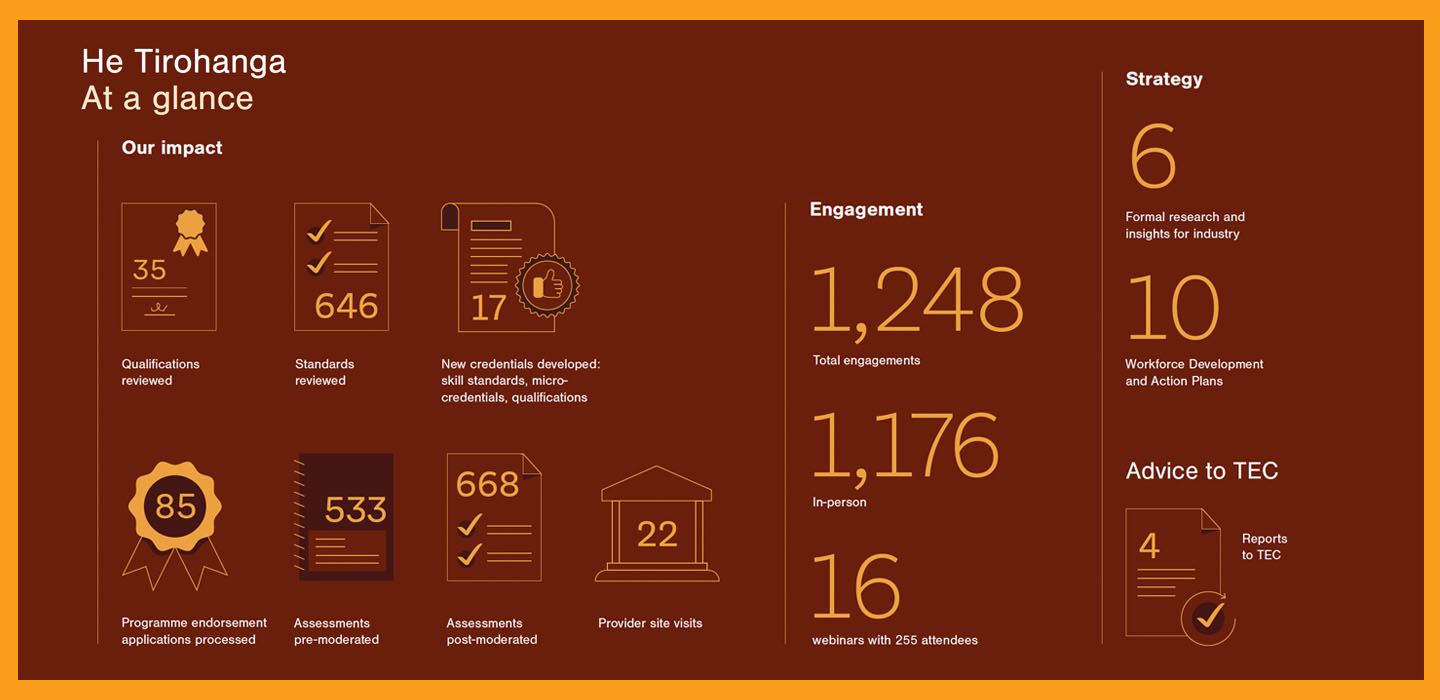
He mihi nā te Tiamana Poari, nā te Tumu, me te Poumatua Mihi from the Ringa Hora Council Chair, Chief Executive, and Poumatua
Whāia i runga i te tika, te pono, te māramatanga, me te aroha anō o tētehi ki tētehi.
Pursue with integrity, honesty, understanding, and compassion towards each other.
We are pleased to introduce the 2023/24 Annual Report, marking another chapter in our journey towards supporting a dynamic and resilient Service sector. The achievements highlighted in this year’s Annual Report are a testament to the dedication and hard work of our kaimahi, partners, and, most importantly, the industry members of the Service sector.
Throughout 2023/24, Ringa Hora has remained focused on our strategic priorities and the unique connection we provide between business and government to amplify the skills needs of industry and employers into the vocational education system. We write this report at a time when the vocational education and training system is undergoing further significant change, with consultation on the future of Workforce Development Councils completed. We are committed to continuing our work with industry to provide the qualifications, standards, and skills leadership needed for the Service sector to be successful.
The global landscape continues to evolve rapidly, presenting unprecedented challenges to economies, industries, and communities worldwide. Yet, amid these challenges, we have seen remarkable resilience and adaptability within the Service sector businesses and workforce. We know that a skilled and adaptable workforce is essential for business productivity, sustainable economic growth and societal progress. Our initiatives over the last year have centred on equipping people with the skills and knowledge necessary to thrive in service.

Deepening our understanding of our industries and their unique needs
At the heart of our efforts lies a steadfast commitment to supporting and serving the industries, businesses, and people within the Service sector. We developed an industry framework that provides a detailed understanding of the 105 industries we cover, including how each industry operates, available training, relevant qualifications, industry associations, and information about businesses in each industry. We have used this framework to inform a considered approach to delivering our functions and where and who we target our engagement efforts.
We have worked closely with industry leaders, iwi and hapū, Māori and Pacific businesses, educational institutions, and government agencies to identify emerging trends and anticipate future skills requirements. We collocated with representatives of our Hospitality industry in Tāmaki Makaurau and Business & Professional industry in Pōneke. This provided excellent avenues to regularly discuss industry challenges and opportunities. Tailored engagements with Māori and Pacific businesses have enhanced our understanding of their needs within Aviation and Financial services.
Building our capabilities to address the future workforce needs of the Service sector
We continue to build our knowledge and ability to address the evolving needs of our industries through strategic partnerships and stakeholder engagement. Our Future of the Workforce research focused on how investment in vocational education and skills training will help the workforce in Aotearoa in 2040 be one of resilience, adaptability, and Māori thriving amidst the challenges posed by digital disruption, disruptive weather events, and demographic shifts.
We published our second annual Workforce Development Plan (WDP) and nine associated Industry Action Plans (IAP) online in September 2023. These provide a strategic framework to address current and future skills needs while also ensuring alignment with industry trends and demands.
Our Investment Advice to the Tertiary Education Commission (TEC) is a key lever we use to support the Service sector in achieving long-term, transformative change in the vocational education system. Through our Investment Advice, we can influence the direction of appropriate resources to support investment in training to meet workforce and skills shortages for our regions, priority learner groups, and industries.

Growing participation in the vocational education system
This year, we’ve engaged in different ways. We’ve reached out to voices already in the vocational education system, as well as those who haven’t yet engaged, with the goal of continuing to grow participation in vocational education. Central to our mission is a commitment to inclusivity and diversity. We firmly believe that a diverse workforce is not only a moral imperative but also presents a strategic advantage. By embracing diversity in all its forms, we enrich our workplaces, foster creativity, and drive innovation.
In 2024, we continued our efforts to promote inclusivity within our workforce development initiatives, with a desire to ensure that opportunities for growth and advancement are accessible to all. We are proud to have established a partnership with the New Zealand Disability Employers’ Network (NZDEN) that will enable us to help workplaces and industry tap into the power of tāngata whaikaha | disabled and neurodiverse people. We are working with NZDEN to unite industry, vocational education, and the disabled community, starting with the sponsorship of their annual Disability Inclusive Pathways Conference. We are also developing a human-resources micro-credential focused on disability and neurodiversity workplace inclusion.
Delivering quality, transformational products
Our comprehensive work plan ensures that the credentials we offer our Service sector continue to be fit for purpose and meet industry needs. Our qualification review and quality assurance mahi moves ahead at pace, with 35 qualifications and 646 of our standards reviewed while also taking a new approach to moderation and engaging with 22 of our providers through on-site visits. And we are proud to have the first skills standards and micro-credentials we developed collaboratively with industry published on the NZQA framework.
Our key transformational project this year, Te Manu Arataki, takes a comprehensive look at how leadership is reflected in qualifications across vocational education to see if we can improve it. Ringa Hora is leading Te Manu Arataki as a collaborative project within Ohu Ahumahi, which enables us to harness transferable skills crucial to New Zealand’s future work landscape across all industries. This provides an opportunity to drive further productivity growth and positively impact businesses and the economy.
As we reflect on the past year’s achievements and look forward to the opportunities that lie ahead, we extend our deepest gratitude to all those who have contributed to our journey. Together, we continue to strive to support the Service sector so that it is prepared for today’s challenges and also poised to seize tomorrow’s opportunities.
In closing, we invite you to explore this year’s Annual Report and discover the stories of innovation, resilience, and collaboration that define our journey. Through these initiatives, we see the contribution of our collective efforts and the desire that we all hold for a brighter future for our Service sector.
Thank you for your continued support and commitment to Ringa Hora Services Workforce Development Council.
Download and read our Annual Report

